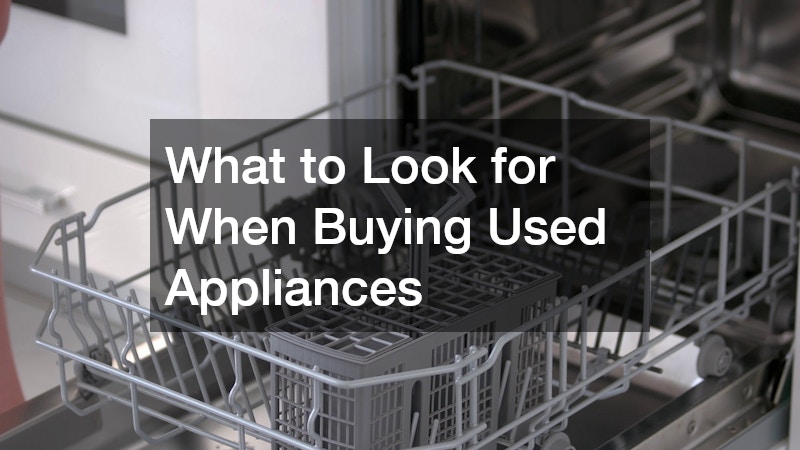
What to Look for When Buying Used Appliances
Purchasing used appliances can be an economical and environmentally friendly decision. However, it’s crucial to know what to look for to ensure you get the best value and avoid any pitfalls. This guide will address some of the most frequently asked questions about buying second-hand appliances.
Evaluating the Condition of a Used Appliance
Physical inspection and signs of wear
Before purchasing a used appliance, it is essential to conduct a thorough physical inspection. Look for any visible signs of wear and tear, such as rust, dents, scratches, and other damage that may affect the appliance’s performance or longevity. A well-maintained appliance will usually show minimal signs of wear, indicating careful use by the previous owner.
Checking the edges, corners, and seals specifically can reveal how well the appliance has been cared for. Scratches or dents might not always impact functionality, but they can indicate how the appliance was handled and stored. Consider the age of the appliance as older ones might have more superficial blemishes due to their longer usage.
Inspect the interior of appliances like refrigerators or ovens for mold or unpleasant odors, which can be signs of neglect. Functionality can be compromised if there are underlying issues, like rust affecting the integrity, or other unseen damages. To ensure a smooth purchase, look beyond surface defects to prevent future inconveniences.
Performance tests and functionality checks
Testing the appliance’s functionality before purchasing is crucial. Plugging in the appliance and running it through its primary functions helps you determine immediate operational issues. For instance, with washing machines, check all cycle settings, and for ovens, ensure the heating elements work efficiently.
It’s advisable to test smaller appliances such as microwaves or blenders in a similar manner. Pay attention to unusual noises or vibrations, which could indicate mechanical issues that might need immediate attention or repairs. Always trust your instincts during these tests; if something feels off, it’s worth investigating further.
Document any issues that arise during these tests, even if they seem minor. You can leverage these observations for negotiating the purchase price or asking the seller to address the issues before completing the purchase. Informed buyers always have the upper hand, minimizing unexpected expenses post-purchase.
Considering the Age and Energy Efficiency of Used Appliances
Identifying the age and estimated lifespan
Older appliances may not last as long as newer models. Identifying the age and expected lifespan of an appliance can help you determine if it’s a worthwhile investment. Look for a model or serial number to check the production date and compare it with the average lifespan of that appliance type.
An older appliance can be more prone to breakdowns, leading to costly repairs in the long run. However, some vintage models are known for their durability and may offer years of service. Balancing age with condition will provide a better assessment of value and reliability for any given appliance.
Consider technological advancements when choosing used appliances. Newer models typically offer better energy efficiency, potentially saving you money on utility bills. Consider your usage needs and match them with the appliance’s features to ensure it meets your expectations.
Assessing energy efficiency and utility costs
Energy consumption is another critical consideration. Review the appliance’s energy efficiency rating to understand its impact on your utility bills and ensure it meets current energy standards. Appliances with higher energy efficiency may have slightly higher upfront costs but will offer savings in the long run through reduced energy use.
The Energy Star label is a good indicator of an appliance’s efficiency by current standards. Recognize that an older device might lack these features, contributing to higher ongoing costs. Assessing energy ratings before purchasing ensures you’re making an informed, cost-effective decision.
Consider the ratio of purchase savings against potential energy usage expenses. A savvy buyer always calculates potential long-term utility increases when deciding on a particular model. An investment in energy-efficient appliances can often offset its initial purchase costs with sustainable monthly savings.
Buying Used Appliances for Reliability
Reputable sellers and trustworthiness
Buying from reputable sellers can significantly reduce the risks involved with purchasing used appliances. Research sellers with good reviews and a reputation for honesty and reliability. Reliable platforms, such as certified dealers and online marketplaces with stringent verification processes, ensure quality checks are made before selling.
Ensure transparency of the appliance’s history and any work done on it, as some sellers refurbish products before selling them. A trustworthy dealer will provide this information willingly, along with the appliance’s condition report. Always opt for sellers who offer clear communication channels and quick responses to inquiries.
Word-of-mouth recommendations can guide you to credible sellers. Friends, family, or community groups often share firsthand experiences that point you toward trustworthy sources. Social trust levels for local sellers can save time and ensure a smooth purchasing process.
Warranties and return policies
Ensure the seller offers warranties or return policies to protect your purchase. These can provide peace of mind and cover unforeseen issues that may arise after the purchase. A warranty serves as a form of a safety net, ensuring minor repairs or replacements are covered within a specific period post-purchase.
Check the fine print of these warranties to understand what is covered and any limitations that might be mentioned. Not all coverage terms are the same, and understanding the scope is essential to avoid unexpected costs. An appliance without a warranty might appear less reliable and should be purchased with caution.
Buying used appliances can offer substantial savings, but it’s essential to approach the process well-informed. By assessing the condition, age, and energy efficiency, and by purchasing from trustworthy sources with sound policies, you can make a smart, sustainable choice. With diligent research and mindful purchasing decisions, used appliances can be both a cost-effective and eco-friendly decision for the savvy consumer.

You may also like
Written by Remodel Digest
Archives
- February 2026
- January 2026
- December 2025
- October 2025
- September 2025
- August 2025
- July 2025
- June 2025
- May 2025
- April 2025
- March 2025
- February 2025
- January 2025
- December 2024
- November 2024
- October 2024
- September 2024
- August 2024
- July 2024
- June 2024
- May 2024
- April 2024
- March 2024
- February 2024
- January 2024
- December 2023
- November 2023
- October 2023
- September 2023
- August 2023
- July 2023
- June 2023
- May 2023
- April 2023
- March 2023
- February 2023
- January 2023
- December 2022
